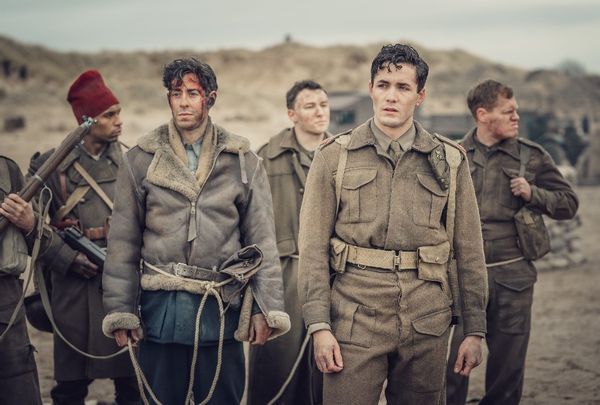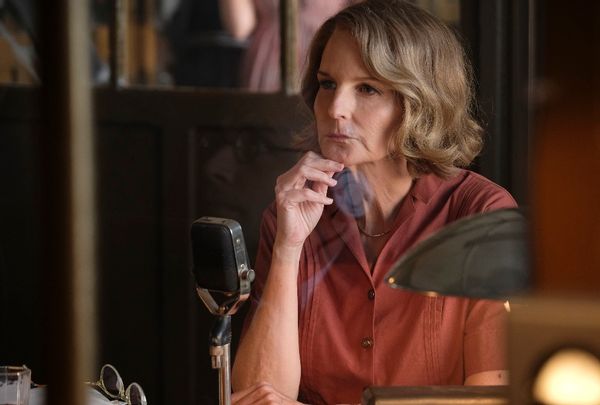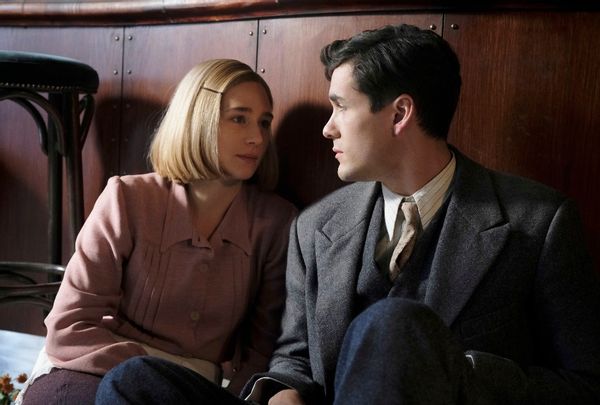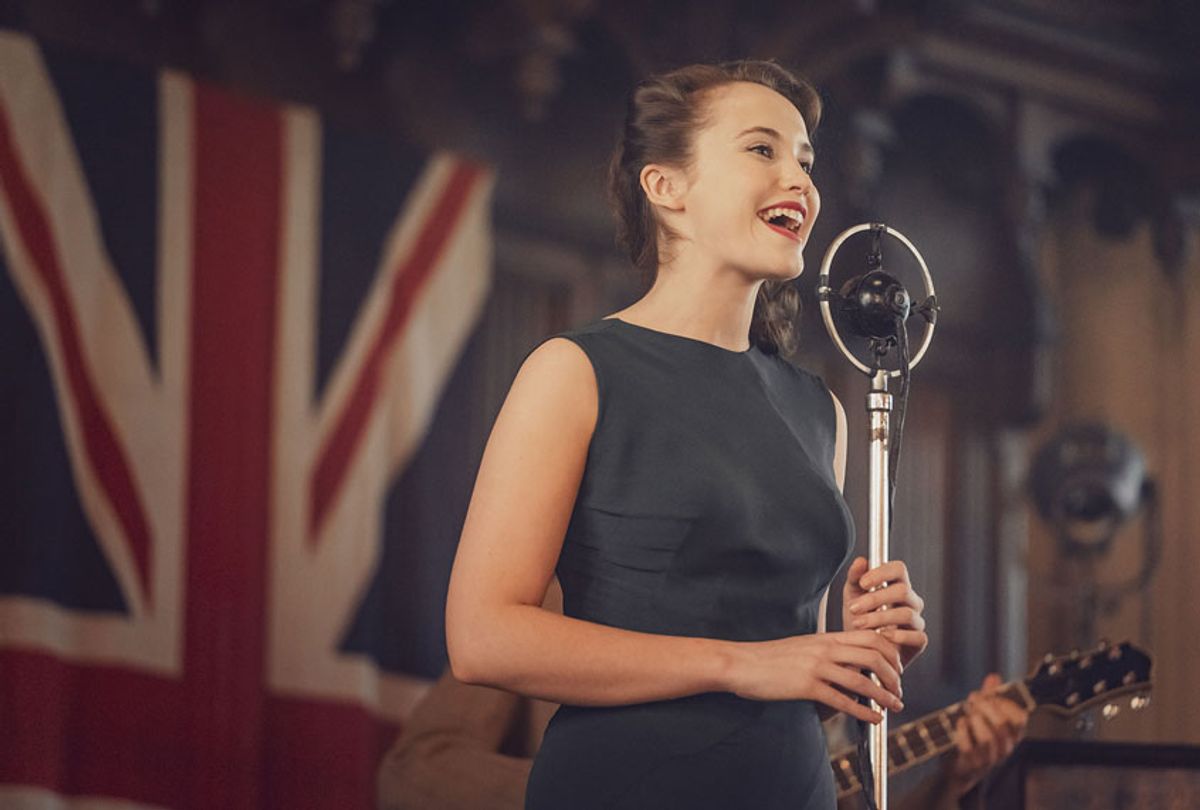In PBS Masterpiece's new seven-part drama series "World on Fire," writer and creator Peter Bowker depicts World War II from multiple fronts to show the insidious and devastating effects of the German forces across Europe. Beginning with the occupation in Poland in 1939, the story follows several families as the encroaching presence becomes a horrifying reality, one that pushes ordinary people into moral quandaries and to make devastating sacrifices.
Bowker's own grandmother was a wartime performer, and she inspired the character of Lois Bennett (Julia Brown), an outspoken and independent British lass whose father Douglas (Sean Bean) has become a pacifist after his previous war experiences. Meanwhile, Lois' brother Tom (Ewan Mitchell) is a ne'er-do-well who somehow finds himself in the thick of the conflict, his father's worst nightmare.
Lois' sweetheart Harry Chase (Jonah Hauer-King) is a translator stationed in Warsaw, where his affections turn to Polish waitress Kasia (Zofia Wichlacz) whose own family must decide whether to flee before the Germans take over or hunker down and hope for the best. But Harry wants to whisk Kasia away to safety back home in England, where his disapproving, right-wing mother Robina (the Oscar-nominated Lesley Manville) is far more sympathetic with those in power than the regular folk.
And then there's American radio correspondent Nancy Campbell (Oscar and Emmy winner Helen Hunt), who is stationed in Berlin but struggles with her precarious position to broadcast the truth of what's happening. Her nephew Webster (Brian J. Smith) is in Paris, but he has his reasons to be reluctant to leave despite her warnings.
Together, these stories weave together over the course of a year, traversing Europe from Warsaw to Dunkirk, Berlin to Paris and Manchester. "World on Fire" has already been renewed for a second season.
Salon spoke to Bowker about his inspirations for writing the series, the research into the period, journalism, and the continued threat of nationalism. The following interview has been edited for length and clarity.
While we in America were involved in World War II, it wasn't necessarily fought on our own turf, except for Pearl Harbor and the Japanese internment, which carries its own trauma. The narrative must go much deeper in Europe though and is personal to almost everyone's history. What was your family's experiences that were related to you?
In the United Kingdom, it's our foundation myth because although most wars are more ambiguous, this one was particularly unambiguous. As that generation dies out, there's a kind of idealization of the war. And I suppose this drama is partly to try and resist that and to reclaim these people's flesh and blood because I think that makes their heroism all the greater if you show them as flawed human beings.
In terms of my personal story, my dad was in the RAF Regiment, which is like the army bit of the RAF (Royal Air Force). Two big clues as to the tone of the piece – my dad was shot by Japanese sniper in Burma. And he was left for dead and he was picked up by the Red Cross, but by the time the Red Cross had picked him up, and he was being treated, my grandma would already have the telegram saying he's missing in action, presumed deceased. She heard nothing for two months, and then he appeared on her doorstep, injured, but recovered. You've got to bear in mind this is Manchester in 1930s, and I don't think women were given to emoting. She said, "Ooh, Eric, your hair needs cutting." So that understatement, right in there is interesting to a dramatist. That stoicism, but also it's funny and it is affectionate.
And then my grandma on my mum's side was a variety artist in round Northern England with the woman I grew up calling my Auntie Anna, who was an English African woman, born in Doncaster in 1912. They formed a variety duo and they called themselves The Two Shades. I think it's a pun on ghosts. But clearly one was black and one was white. Those were the so obviously in terms of building blocks for the drama. It's such a strange idiosyncratic story.
The main incentive was to reclaim that generation, and I did a lot of reading. There's Richard Yates' novel called "A Special Providence," and it feels reassuringly contemporary in tone and in the language people used. So I wanted to make a costume drama that didn't feel like a costume drama I suppose.

Did you do other more anecdotal research? Did you speak to any people of that generation besides your parents?
Well, my dad's long gone, but my main way through was diaries. The Imperial War Museum in London was just astonishing in what they could uncover. You know, I would literally say, "Can I have three kinds of verbatim accounts of Dunkirk from sons on the ground?" The archive is astounding. I mean, with something like this. You have to make sure the material isn't shaping you because it just it spreads and spreads. And, and so that so that's how I tried to capture the vernacular of the times.
You mention that this World War II story is less ambiguous as far as we agree who the bad guys were. However, nationalism isn't dead and appears to be on the rise with Brexit, on the rise everywhere, echoing themes from that era. With this World War II tale that has already aired in the U.K., have those discussions been resurrected?
Well, what's interesting to me is that between when I started writing it in 2014, between then and now, this has become a more pertinent story, it's become more topical. You know, there's a situation where countries were engaged in international cooperation in order to defeat Nazis. The Soviet Union and the U.S. didn't have a lot in common, but they found common ground.
So it seems to me more pertinent. I mean, the puzzling thing for me about World War II's position in the United Kingdom is, at the extreme right-wing end you literally get British fascists doing Hitler salutes next to a war memorial. These guys aren't big on irony, but it's the way it's used to support a narrow nationalist viewpoint. It seems just ridiculous to me.
But what I'm also interested in is how, because we can accept who the good guys were, then as a dramatist, that opens the window to look at the moral ambiguity. Like Piers Morgan, who is outrageous on an almost daily f***ing basis, was outraged by somebody suggesting that Winston Churchill was a white supremacist in his beliefs. Well, Max Hastings, who is a conservative historian, says exactly the same thing. And he says that what is part of his racial certainty made him conduct the war in the way he conducted it.
There's an irony at the heart of that. Now that's interesting and nuanced. It doesn't make him any less brilliant as a wartime leader. I find it more interesting that he had this desire, and most white politicians of that era would have believed in the racial superiority of the white man. You know, just as Churchill believed in eugenics every bit as much as [the Nazis]. It was seen as a respectable ideological belief. So I think that there's a whole way of looking at those and saying, "Well, those beliefs and human failings that make it more interesting and more engaging and ultimately, greater acts of heroism than not." But it's easy in the age of Twitter and clickbait to just be, "How dare you?"
People can't always see how awful a situation is though in the moment. The state of our countries didn't happen overnight, but gradually to the point that some people have become inured to this reality without questioning it. Is this what you tried to depict when it came to the various characters who would not flee – whether it's Paris or Warsaw – despite all evidence pointing to a worse existence if they stayed?
Obviously you can't trade too much in dramatic irony, because there's history, but it's definitely the intention to show that these things creep up on us. It isn't like one day you wake up and you've got a decision to make. "Are you going to collaborate with us? Or are you going to collude?" It doesn't happen like that. We want and expect things to blow over and we want and expect things to get better, or to not get any worse.

One of those people who sees more clearly is Helen Hunt's reporter character, Nancy, who is sort of an amalgam of American war correspondent William Shirer and the English counterpart, Claire Hollingworth, who was the first to break the story of the German invasion of Poland. It's fascinating to see the amount of collaboration Nancy needs to do with the German censor Schmidt (Max Riemelt). So what did you in your research learn about like what that line was? There were a few times that I was surprised she would get away with things she said on her broadcast.
That was what was interesting from the William Shirer diaries . . . about his broadcast. He was always surprised that they literally didn't mind his open reporting on intimidation and deportation of Jewish people. But they did mind when he – and in the drama she too – alludes to a shortage of carp at Christmas, because that's part of German Christmas dinner. So he could never second-guess where they were going to object. But also interesting, he said he could often use a tone of voice and signal disapproval in his broadcasts.
Also, I think that's what allowed the British to brush away Claire Hollingworth's suggestion that the Germans weren't playing by the rules. You know, there's a kind of hairy superiority thing going on to do with, "Well, that's how we do things." You know, it's not a gentleman's agreement of this is how we conduct war, which the blitzkrieg and everything seemed put paid to. In the build-up to the war, certainly there was a sense that it would be conducted very much along the grounds of the First World War because the higher echelons of power across Europe had more in common with each other than they often did with the people that they were serving.
Something that also struck me was the obviously slower pace of reporting, crafting a story over days before sending a dispatch, compared to, let's say, the internet's instant supply and demand for content. It's war, but where is the urgency?
Absolutely, yeah, the consideration put into nuance, it just is not available now really. It's available in newspapers, but nobody's buying newspapers, and back then there was a lack of hysteria in journalism. It wasn't the "cut and paste" mentality of take one quote out of context, tweet that, and that's the job done. There was a friend of mine when he quit his job at The Guardian, he realized part of the job was somebody had to do a shift everything every night just monitoring Twitter.
It is fascinating, isn't it because of the speed with which any message goes. But during World War II, it would be days before it went out. Hence, when Claire Hollingworth, the British journalist, saw Nazis on the border, she said to the British, "I can hold this [story] for three days." And they were probably thinking, "Hysterical woman, you must have seen something else. The Germans couldn't possibly be doing anything like that." And then they ran it, and it still didn't really have a major impact. So obviously, it's a bit of a gift to a dramatist because the trappings of that era of journalism are so seductive and beautiful.

In creating the Harry Chase character, he's in a sticky love triangle. At first, I was watching and thought,"Is this going into 'Mrs. Wilson' territory? That miniseries where Ruth Wilson's had a bigamist spy grandfather?" I think there really is something to that wartime era, of men going abroad and leading a double life, getting emotionally involved away from home. What was your approach to that storyline?
He kind of embodies what I wanted to do really, which is I wanted all of my characters to be flawed and yet still capable of individual heroism and also for him to change.
I wanted to get a character who we weren't necessarily going to like or at least approve of to begin with. He's a rather pampered boy who has always had his own way, and he's attractive and then he's not even loyal [to his girlfriend]. But also I think for Harry, in a weird way in Poland, what he finds is a family warmth that's entirely lacking in his life [in England].
And that's I suppose why we left the leave-taking with Lois slightly more ambiguous, that she sort of pushed him away. And now I know that feels a bit like Ross saying, "We were on a break," but he's young, he's away from home. And I don't think he knows himself at all. I think he thinks he can fix things that he can't. And maybe his love life is part of that.
Harry's mother Robina is played by the Lesley Manville, who can deliver any line, and she gets some of the best/worst ones. This is a family who says some awful things to each other, and she espouses some pretty cringeworthy and often racist ideas. What was that like to write?
I am alarmed by how easy it is for me to write horrible right-wing characters. It was a joy to write. We had Lesley in mind all along, and Robina's character would be very, very concerned with manners. And I'm always interested when somebody has been very sort of big on manners could say the most disgusting and outrageous things. They're always the ones.
Writer Jimmy McGovern had told his writing students, "I want you to go away and write the monologue from the point of view of the person you disagree with the most justifying their beliefs. Make an argument for the beliefs that aren't yours." And that's kind of what drama should be doing. I like that Robina is, I have this thing in it that the older generation don't think they are capable of change, yet they change. And the young people think they can change everything. So between them that there is some change. But I think it's interesting to explore where that mindset comes from for her . . . what pain is it channeling really, what sense of disappointment is it channeling?
Manville is a casting dream in this role. Did you get a say in choosing her?
Yeah, I mean, kind of get to because I'm well-established now and I can kind of insist on it. I was involved in most of the casting decisions. And in fact, I had to make the phone call to Sean [Bean] because he was a little unsure. And his main concern was – Sean Bean said to me, "Do a die?" And I said, "No, you live," and he goes, "I'll do it."
The seven-part "World on Fire" premieres on Sunday, April 5 at 9 p.m. ET on PBS.



Shares